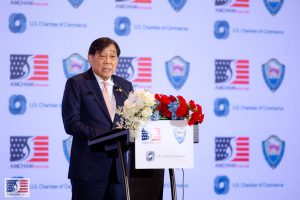Thailand’s government is committed to establishing a fair trade relationship with the United States, its finance minister said this week, predicting that the country’s proposed trade concessions could reduce its existing trade surplus with the U.S. by a third.
Addressing an American Chamber of Commerce investment forum in Bangkok on Tuesday, Pichai Chunhavajira said that his government had submitted a proposal to Washington that aims to address the trade imbalance, “including by enhancing market access for U.S. exports” and “tackling transshipment violations,” as Reuters paraphrased his comments.
During President Donald Trump’s “liberation day” tariff announcement on April 2, Thailand was hit with a 36 percent tariff that threatens. The two nations are expected to begin formal negotiations over the tariff soon, the enforcement of which has been postponed until July.
“I’m positive that we have a strong set of practical and viable proposals that can effectively lead to win-win results and deliver tangible quick wins,” said Pichai, who has been appointed to lead Thailand’s trade team. He added that efforts to crack down on trade circumvention, announced by the Thai government in mid-April, “are being translated to action now.”
Thai negotiators have submitted a number of proposals to the Trump administration in advance of formal trade negotiations. These have mostly centered on pledges to increase imports of U.S. goods, including natural gas and agricultural commodities such as corn and soybean meal, and to promote investments by Thai companies in the United States. During Tuesday’s event, Pichai said that Thailand was keen for partners in green energy and interested in working with U.S. biotech and food processing companies.
Like Vietnam, Thailand has also announced a crackdown on the practice of trade circumvention, by which foreign companies attempt to avoid U.S. tariffs by claiming false certificates of origin from a third country.
In his address on Tuesday, Pichai estimated Thailand’s various proposed measures could cut the U.S. deficit by up to $15 billion. This would represent around a third of the current deficit, which totalled $45.6 billion in 2024, the 11th largest of any nation and the second-highest in Southeast Asia after Vietnam.
Thai officials are hoping to negotiate a significant reduction in the 36 percent tariff, which would have a significant negative effect on the country’s trade-dependent and currently stagnant economy. In late April, Moody’s Ratings announced that it was downgrading Thailand’s rating outlook from “stable” to “negative,” citing the likely impacts of American tariffs, which it said would have a “material negative impact” on the country’s economy. This came a day after the World Bank trimmed its projections of Thai growth for this year from 2.9 percent, a prediction made in January, to just 1.6 percent. The U.S. was Thailand’s largest export market last year, accounting for 18.3 percent of its total exports.
Separately, Prime Minister Paetongtarn Shinawatra’s administration announced this week that it was reallocating 157 billion baht ($4.7 billion) of budget spending away from its “digital wallet” stimulus program to fund projects that will help counter the impact of U.S. tariffs. These include investment in water management, transport, and logistics projects, as well as soft loans for small businesses, Reuters reported.
The flurry of Thai actions reflects the broader regional concern about the tariffs, which pose a potentially fatal challenge to the export-led industrialization that has underpinned Southeast Asia’s economic success. While most nations have issued proposals to address U.S. concerns, they have also made incipient moves to reduce their dependence on the U.S., a country increasingly allergic to the free trade principles that it once championed (and sought to impose on others).
Virtually every high-level bilateral meeting involving the region’s Asian leaders over the past two months has referenced the U.S. tariffs, either implicitly or otherwise, and included pledges to expand bilateral and intraregional trade. For instance, the issue was explicitly referenced during Chinese President Xi Jinping’s state visit to Vietnam in early April, and then during Japanese Prime Minister Ishiba Shigeru’s trip to Hanoi two weeks later.
During her own state visit to Vietnam last week, Prime Minister Paetongtarn and her Vietnamese counterparts agreed to raise bilateral trade to $25 billion by the end of the decade, up from around $20 billion currently, to “strengthen the connection between the two countries’ supply chains,” to encourage mutual private sector investment, and “to create a business-friendly environment to mitigate the impacts of current global trade tensions.”
Hosting Indonesia’s President Prabowo in Bangkok a few days later, Paetongtarn announced that the two nations would set up a joint government committee to promote bilateral trade between their economies, Southeast Asia’s largest.

































